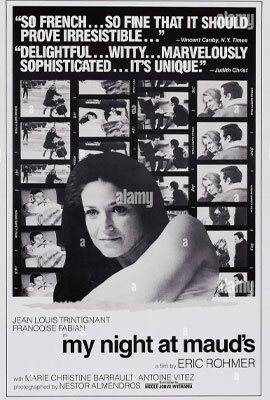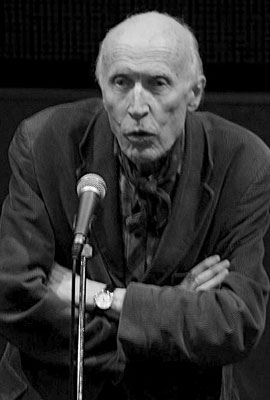
(1969)
directed by Eric Rohmer
“My Night At Maud’s” is an extraordinary movie about life, love, and the games people often play. The characters are well educated and articulate. The main character is an engineer in his thirties (Jean-Louis Trintignant). He is a devout Catholic, very conservative in his beliefs, and would like to get married.
Jean-Louis drives from his home to a cathedral in the town of Clermont-Ferrand to attend Christmas Eve mass. During the mass, he notices an attractive blonde woman (Marie-Christine Barrault) but does not speak to her. He decides she is the woman he wants to marry. A few days later, he runs into an old friend, Vidal (Antoine Vitez), and they share a meal. Vidal teaches philosophy and they discuss the philosophy of Pascal over dinner.
After their meal, Vidal suggests they visit Maud, a beautiful, recently divorced pediatrician played by Francoise Fabian. It appears that Vidal is in love with Maud. Nevertheless, he encourages Jean-Louis to spend the night at Maud’s home because it has started snowing and the streets are treacherous. On the other hand, he may be testing Maud. We can’t really be sure. Jean-Louis resists but eventually decides to spend the night. Vidal departs, leaving Jean-Louis and Maud alone together.
Jean-Louis, who recently began re-reading the writings of Blaise Pascal, relates his beliefs to the philosopher’s famous wager that it was logical to believe in God because if he does not exist, you lose very little by believing but gain everything if he does. Pascal was a Jansenist, a sect of French Catholicism that believed that salvation can only be achieved through God’s grace and that God’s grace is predestined regardless of our actions. In opposition to the Jansenists, the Jesuits advocated pursuing a virtuous life to gain entry into heaven. Jean-Louis likes to think of himself as following the Jesuit path. In a sense, his evening at Maud’s is designed to see if he is true to his beliefs.
Jean-Louis and Maud are very far apart regarding their life experiences and beliefs. Jean-Louis talks about his faith in God and his belief that he will meet and marry the right woman. Maud tells Jean-Louis about her marriage, her former husband’s mistress, and the devastating end to her affair with the only man she ever really loved. Jean-Louis and Maud talk almost the entire night. Maud is in her nightgown and sits in bed propped up against her pillows. Jean-Louis walks around the room or sits in a chair. On a few occasions, caught up in the conversation, he drops his reserve and briefly reclines across the foot of Maud’s bed, propped up on one elbow.
They talk about sex, love, marriage, and divorce. Maud reveals details about her past and is emotional at times. Jean-Louis reveals very little about his past relationships and is emotionally reserved. He says that each of his past relationships taught him important moral lessons. He doesn’t provide any details, however, and speaks in abstract terms. Maude encourages Jean-Louis to be more forthcoming. Their conversation captures the longing for happiness as well as the fear and doubts that make our search for a romantic partner so emotionally fraught. Maud, who is sincerely attracted to her guest, tries unsuccessfully to seduce him. They part on friendly terms.
Five years later, Jean-Louis and Maud cross paths and there is a very painful revelation. Relationships from their past have cast a shadow on the present. Whether you consider this to be “emotional baggage” or the “consequences of sin” depends on your philosophical and religious point of view.
Rohmer delayed filming for an entire year so that filming could take place during the Christmas season. The setting and season are very important. The snow covered city is photographed in gorgeous black and white by the renowned cinematographer Nestor Almendros. Nestor Almendros was also the cinematographer for Terrence Malick’s extraordinarily beautiful film, “Days of Heaven.”
Eric Rohmer

Eric Rohmer, the director of “My Night at Maud’s,” is considered to be the last filmmaker to join the French New Wave. He was friends with Jean-Luc Goddard and Francois Truffaut but started film making after their film making careers were well established. Rohmer began his film career as a film critic. His article “Celluloid and Marble” is frequently referenced by film critics. In this article, he examines the relationship between film and the other arts. He concludes that in an age of cultural self-consciousness film is “the last refuge of poetry.”
Rohmer is renowned for his film series “Six Moral Tales.” “My Night At Maud’s” is the third of Rohmer’s “Six Moral Tales.” Each tale follows roughly the same story. A man, married or otherwise committed to a woman, is tempted by a second woman but eventually returns to the first woman. Rohmer stated that he wanted the “Six Moral Tales” to express feelings buried deep in our subconscious. “That’s why they have to be narrated in the first person singular. The protagonist discusses himself and judges his actions.”
Rohmer’s films are especially noteworthy for their naturalistic dialogue. Watching his films is a voyeuristic experience that always reminds me of “listening in” on adult conversations as a child. The director’s characters engage in long conversations, mostly talking about relationships. Rohmer said he wanted to look at “thoughts rather than actions.”